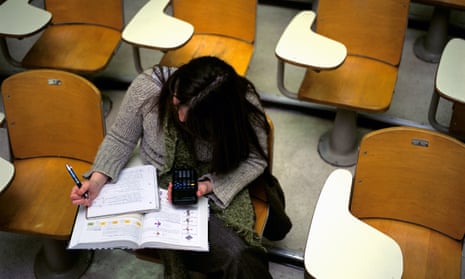The University of Technology Sydney is trying to encourage more young women to study engineering, computing and construction degrees by adjusting year 12 entry scores for female applicants.
The university has received approval from the NSW Anti-Discrimination Board to make a 10-point adjustment to the Australian Tertiary Admission Rank of female students applying for those degrees for the 2020 academic year.
The university hopes it will help address gender imbalances in those male-dominated industries.
UTS Women in Engineering and IT director Arti Agarwal insisted the move would not lower standards.
“We’re not taking in underperforming students or doing tokenism here,” she told Guardian Australia. “Nobody is getting a free pass … They all have to do all the degree requirements [and] internships.”
Agarwal said the move was part of the university’s 30-year effort to improve gender equity in engineering, which includes primary school and high school outreach programs and mentoring for female engineers.
“We looked at the performance of Atar and the performance of [grade point average] so a lower Atar did not mean they would get a lower GPA. A higher Atar did not mean they were best in the class,” Agarwal said.
She noted a large number of engineering students gained entrance into the undergraduate degree through other pathways, which often were lower than the year 12 Atar minimum score.
Agarwal said previously that, on average, females received 4-8% of UTS offers to study mechanical engineering/mechatronics. The university expects the score adjustment will increase female study offers to about 20%.
In civil engineering on average 16% of offers are to female students and this could rise to 20%. In computer science 10% of offers are to female students and this could lift to 19%.
According to Engineers Australia, 84% of Australian engineering graduates are men. Female engineers make up 13% of the workforce. Australia faces a looming shortage of engineers.
A 2017 Engineers Australia report found part of the problem was low levels of female high school students were studying the prerequisite subjects. Less than 6% of girls nationally studied physics in year 12, with advanced maths at 6.2%.
Engineers Australia’s professional diversity manager Justine Romanis backed the UTS move.
“We need to be disruptive – what we have been doing to date is just not working,” she said.
She said to attract more females to engineering it was important to plant the seeds early with research backing career discussion with children as young as year 4.
Virginia Singh, who studied a double degree in mechanical engineering and science at Deakin University and now works in the defence industry, does not think it is a good idea. There were two female students in her mechanical engineering course. Singh’s father and brothers are also qualified engineers.
“I don’t necessarily think that it’s the score stopping females from joining engineering, there’s more so a stigma associated with it or Stem in general,” Singh told the Guardian. “There’s a perception that you need a strong Stem and technical background and although you need that, most of the day-to-day work is soft skills as opposed to … technical calculations every day.”
The UTS announcement has attracted some criticism on social media.
As a woman I'm offended! This move reinforces the myth that women as not as smart as men.
— Sophie Baker (@SophiesBaked) August 29, 2019
Many universities allocate adjustment points based on disadvantage or illness, but UTS Director of Women in Engineering and IT, Arti Agarwal, said she believed the university would be the first to base them on gender.
— 🦝shaniqua707🐩🤡🦟🧮 (@shaniqua7071) August 29, 2019
So being a woman is a disability now?
If you think the best way to get more women into engineering is to lower the standards, aren’t you kind of openly saying you think female engineers aren’t as good as male engineers
— Godot (@GodotIsW8ing4U) August 29, 2019
In 2016, the Australian National University announced that it was broadening its admission processes for engineering degrees away from reliance on Atar scores towards broader selection criteria.
Atar is a number between 0.00 and 99.95 that indicates a student’s position relative to all the students in their age group.
